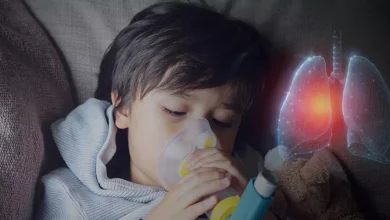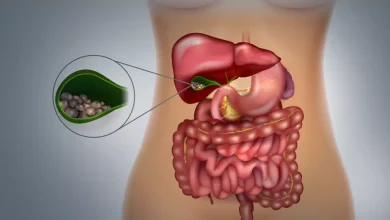All about Tongue Cancer?
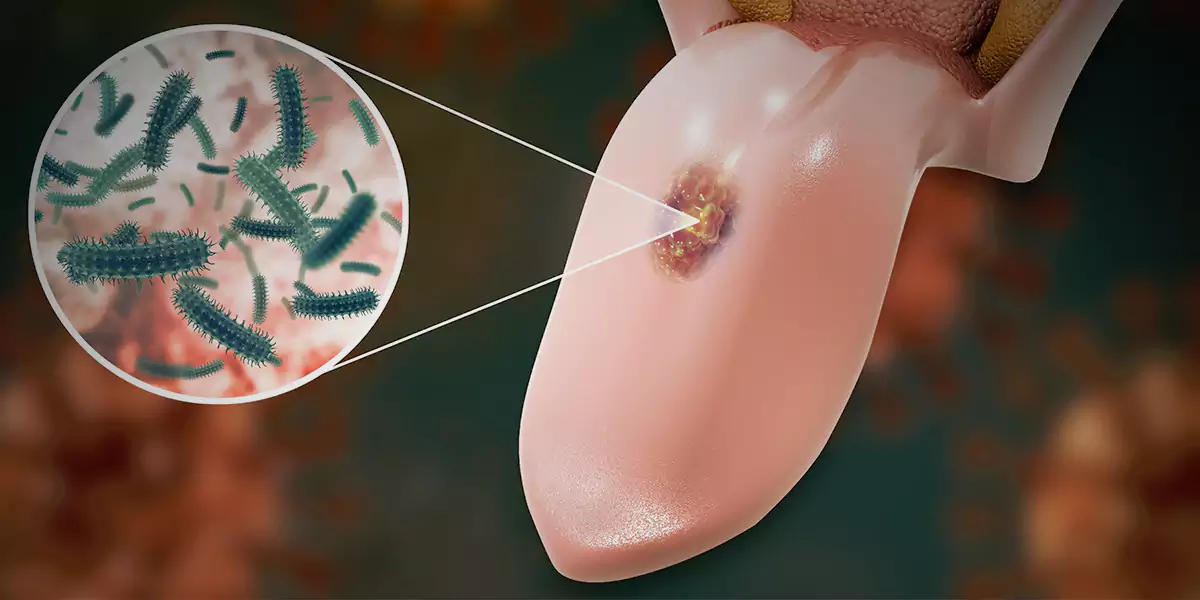
What is Tongue Cancer?
Tongue cancer is a type of oral cancer and it develops in the cells of your tongue. Like all types of cancers, tongue cancer develops when the cells get out of control and get divided and form a tumor or lesions in the tongue. It’s also known as ‘oral tongue cancer’ because it mostly develops on the front of the tongue. Sometimes it might develop at the tongue’s base, adjacent to the bottom of your mouth and it’s known as “oropharyngeal cancer.” Tongue cancer is not as common as other types of cancers and it mostly occurs after the age of 60 and it’s quite rare in children.
What are The Types of Tongue Cancer?
Tongue cancer itself is a type of oral cancer but tongue cancer can be divided into two subtypes based on the area it occurred such as:
Oral tongue cancer: Oral tongue cancer occurs in the mouth and develops in the front two-thirds of the tongue and is visible. If it’s diagnosed in the earlier stage and can be removed through surgery quite easily.
Hypopharyngeal tongue cancer: It develops on the base of the tongue where it’s connected to the throat. Unlike oral tongue cancer, it can be diagnosed when it’s in an advanced stage and the tumor becomes large. It spreads to the lymph nodes in your neck and throat.
What are the Symptoms of Tongue Cancer?
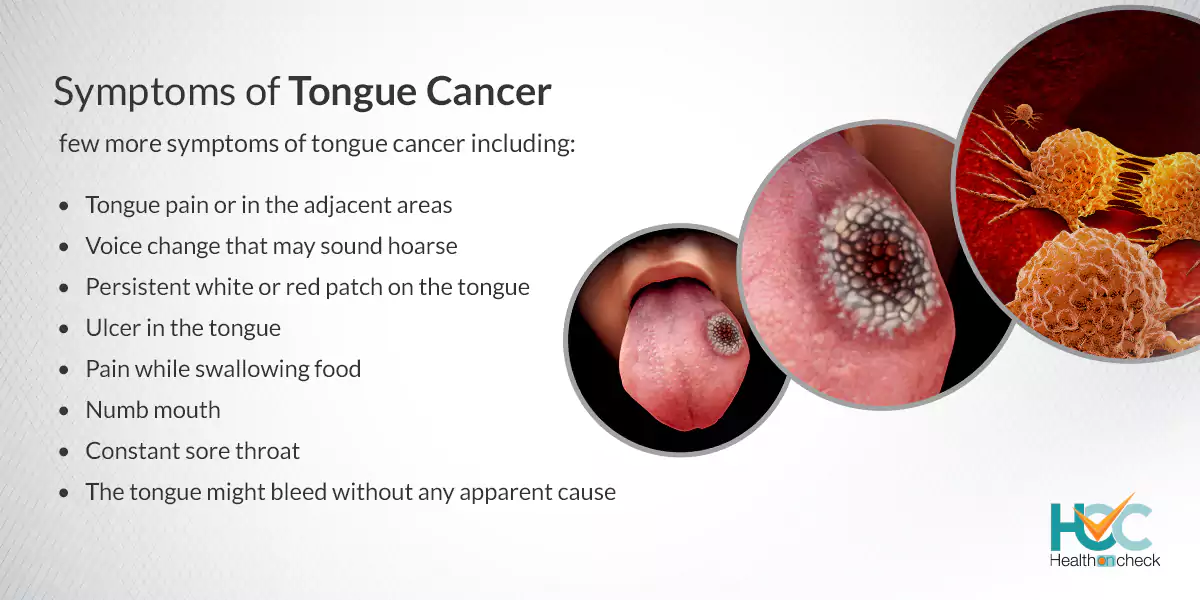
A lump or sore on your tongue is the first symptom of tongue cancer that might be of pinkish-red colour. Sometimes there can be bleeding in the sore if you bite or touch it.
In addition, there are a few more symptoms of tongue cancer including:
- Tongue pain or in the adjacent areas
- Voice change that may sound hoarse
- Persistent white or red patch on the tongue
- Ulcer in the tongue
- Pain while swallowing food
- Numb mouth
- Constant sore throat
- The tongue might bleed without any apparent cause
- A persistent lump on the tongue
What is the Cause of Tongue Cancer?
Tongue cancer usually develops from the flat squamous cells that line the exterior part of the tongue. Then it starts dividing into a bunch of abnormal cells, which develops into a tumor. Heavy tobacco and alcohol are associated with tongue cancer. Tongue cancer can occur because of human papillomavirus (HPV) which might cause cancer on the base of the tongue.
In the past tongue cancer mostly affected older people and smokers but in the last couple of years, the number of people with tongue cancer increased among adults because of HPV infection. HPV is a sexually transmitted disease and it can cause various types of cancer in the cervix, anus, genitals, anus, mouth, and throat.
70 percent of oropharyngeal cancers, including cancers of the base of the tongue, develop because of HPV.
What are the Risk Factors of Tongue Cancer ?
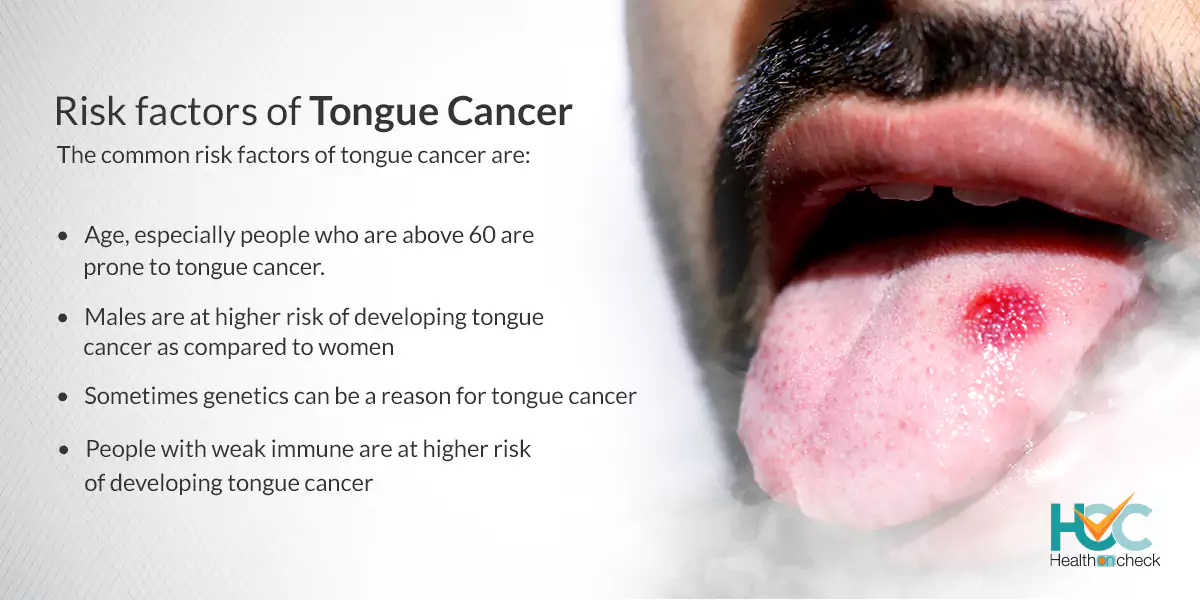
The common risk factors of tongue cancer are:
- Age, especially people who are above 60 are prone to tongue cancer.
- Males are at higher risk of developing tongue cancer as compared to women
- Drinking alcohol excessively and taking tobacco in any form increases the risk of tongue cancer
- Poor nutrition also increases the risk of getting tongue cancer. Having fruits and vegetables and sources of vitamin A in your diet is helpful to avert tongue cancer because of poor nutrition.
- People with weak immune are at higher risk of developing tongue cancer
- Sometimes genetics can be a reason for tongue cancer
- Inflammation of mucous membranes can also make you prone to tongue cancer.
- Human papillomavirus (HPV), a sexually transmitted disease can cause cancer if you had unprotected sex with a person with HPV
What are the Complications of Tongue Cancer?
Tongue cancer and its treatment can cause several complications including:
- If your cancer is not diagnosed early then you may have problems while eating and swallowing food
- Finding it difficult to speak
- Constant pain in the affected area
- Breathing problems
- If not treated during the earlier stages then it can be fatal also and can lead to death
- Getting to know you have cancer can have negative emotional effects on you, especially depression.
- There might be a change in your appearance after going through a surgery
- Blood clots can be a complication post-surgery. The complications of blood clots are that they can become loose and spread to other parts of your body through the bloodstream and if it reaches the lungs then they may cause blockage in the lungs. It may swallow many parts of your body and sometimes there might be blood in your cough along with pain in the chest
- The risk of infections increases after the surgery, like chest, urine, or wound, infection.
- Bleeding from the area of surgery
- The area of surgery may become numb
- Post-surgery, the area might get swollen. If the lymph nodes in your neck are removed, the swelling may be because of lymphoedema which may take some time to get normal
How Tongue Cancer is Diagnosed?
Your doctor will first check your family history because genetics is also one of the causes of tongue cancer. You may be asked questions such as if you smoke or drink and if your answer is yes then what is the quantity you consume? Then you may have to go through a test to check whether you ever had human papillomavirus (HPV), a sexually transmitted disease.
The doctor will physically check your mouth to see if you have a tumor or any kind of ulcer and if the doctor suspects tongue cancer then a biopsy test will be taken where the doctor will remove a small piece of the suspected cancer and send it to a laboratory to confirm cancer.
If cancer is diagnosed then you need to go for a CT scan and MRI to check the stage of the tongue cancer and how far it has spread till now. X-rays will be taken from various angles and put together to show a more detailed picture of cancer.
What are the Treatment Options Available for Tongue Cancer?
Treatment for tongue cancer is based on the stage, how big the tumor is, and how far cancer has spread. After checking all these things, your doctor will begin the treatment which might include:
Surgery: he surgeon will remove the tumor along with theadjacent healthy tissues to make sure that all the cancer cells are gotten rid of. If the tumor is small then there won’t be many problems but in case of a large tumor a part of your jawbone your tongue has to be removed. In case cancer has spread to the lymph nodes in your neck then the lymph nodes and related tissue in your neck will be removed. After surgery, your doctor may recommend you go for reconstructive surgery to repair your mouth so that you can talk and eat normally.
Radiation therapy: Radiation therapy uses high-energy beams, like X-rays and protons are used during radiation therapy, to kill cancer cells. Radiation therapy is usually carried out post-surgery. But if your cancer is diagnosed in an early stage then it is used to kill cancer cells and there may be no need for surgery.
Chemotherapy: During chemotherapy, strong medicines are given as tablets or pills. Chemotherapy medicines are sometimes given alone, and sometimes with other medicines. During radiation therapy chemotherapy medicines are usually given as it increases the effectiveness of radiation therapy
Targeted drug therapy: Targeted drugs alter certain aspects of cancer cells and stop their growth. Targeted drugs may be used alone or they can be used along with radiation therapy and chemotherapy.
Living with Mouth Cancer
Getting diagnosed with tongue cancer can be overwhelming and stressful. But you should not panic as it is curable and getting treatment in the early stages augments the chances of getting cured easily. Dealing with the emotional impact that comes with any kind of cancer is not simple but you have to be strong enough to cope with the grief and shock. Discuss with your doctor about the treatment procedure in detail. Keep yourself close to dear friends and family as it will make you feel strong and help you to cope with the situation more effectively.
Whom to Consult?
If you notice symptoms of tongue cancer like swelling and pain in the tongue or throat for more than a week then immediately contact your doctor. After checking your condition, if cancer is suspected then your doctor will recommend you to consult a cancer specialist who will diagnose your condition and if the cancer is confirmed then he will start the treatment according to the stage of the tongue cancer.

